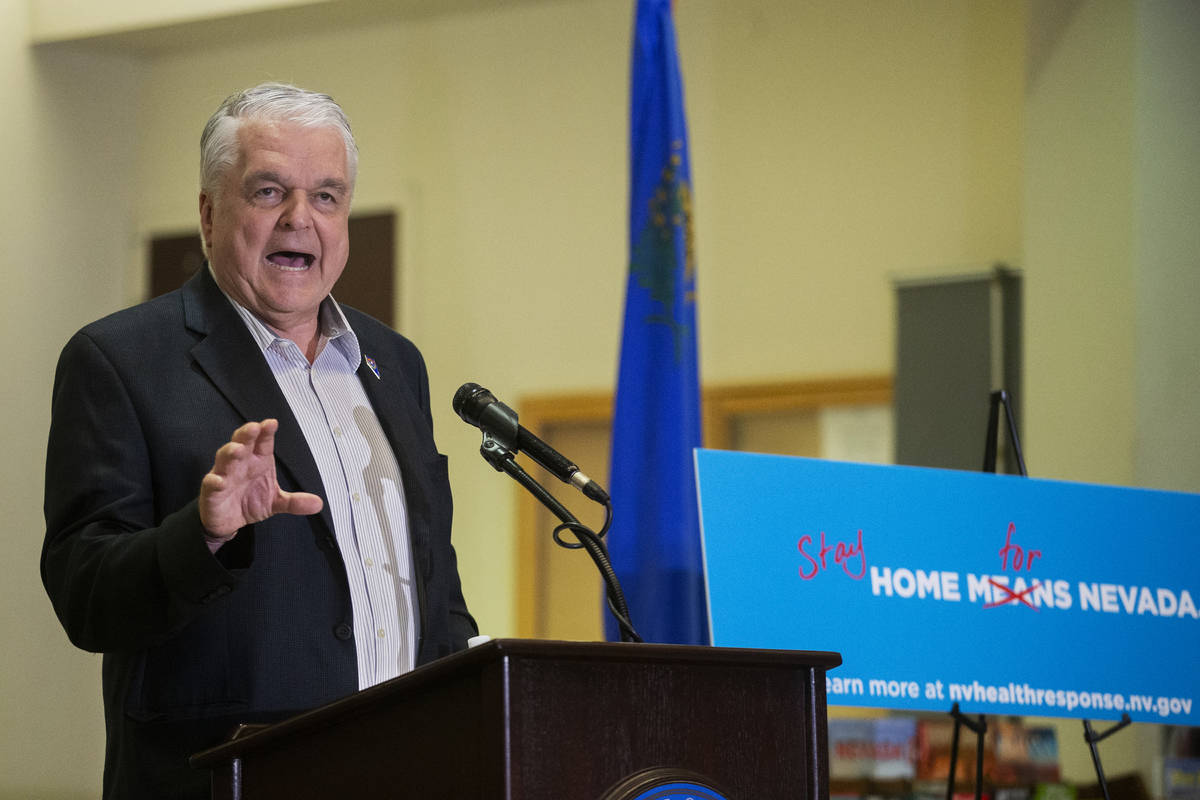Expert: Sisolak’s shutdown powers flow from state law
Gov. Steve Sisolak on Friday modified his strong suggestion that all nonessential businesses in Nevada close for 30 days to fight the coronavirus into a formal order that they do so.
So, is he on firm legal ground? And can he back it up?
A professor at the Boyd Law School said he is, and he can.
“He has the authority to do it if he wants to,” said Ian Bartrum, a professor of constitutional law.
Bartrum cited the 1905 case of Jacobson v. Massachusetts, in which the U.S. Supreme Court upheld the authority of states to force people to receive vaccinations, in that case, for smallpox. The court held that sometimes individual freedoms must yield to the common welfare.
In Nevada, the Legislature has passed specific laws granting the governor broad powers in emergency situations. Sisolak signed a declaration of emergency on March 12.
Nevada law
Under the state’s emergency management laws, the governor can assume direct control over all emergency management in Nevada.
Those powers include the authority to turn off “all lights, and lighting devices and appliances,” coordinate the efforts of utilities to turn off and on service to the public, direct the movement of pedestrians and cars during emergencies and take control of public meetings or gatherings.
That law also gives the governor the authority to “make, amend and rescind the necessary orders and regulations to carry out the provisions of this chapter with the limits of the authority conferred upon the governor in this chapter.”
And, in a separate statute, the governor has the authority “to procure, by purchase, condemnation, seizure or other means, construct, lease, transport, store, maintain, renovate or distribute materials and facilities for emergency management without regard to the limitations of any existing law.” But the law is clear that the governor must compensate private property owners if he exercises that power.
That same law gives the governor broad authority “to perform and exercise such other functions, powers and duties as are necessary to promote and secure the safety and protection of the civilian population.”
Bartrum said that authority can override the rights to due process once a state of emergency has been declared. However, he said, people could always sue, arguing the state could have used a less restrictive order to both combat the spread of the virus and allow businesses to operate.
And, he said, the governor’s authority to enforce directives such as his nonessential business shutdown order is obviously implied in the statute.
Attorneys general opinions
With state law, a skein of opinions from past attorneys general in the state suggest the governor has the power to order businesses to close, although the question doesn’t appear to have been asked directly.
In 1995, then-Attorney General Frankie Sue Del Papa wrote that Mineral County couldn’t pass a broad emergency powers ordinance that included the ability to impose a curfew and to shut down businesses that sold gasoline, alcohol and firearms and ammunition because those powers properly belonged to the state.
“Most importantly, however, under (Nevada Revised Statutes) chapter 414, the governor is given specific powers in the event of an emergency that will preempt all emergency-related county ordinances that are not themselves specifically authorized by statute,” the opinion reads. “For example, NRS 414.060 allows the governor to direct and control the ‘conduct of civilians and the movement and cessation of movement of pedestrians and vehicular traffic’ along with ‘public meetings and gatherings’ in the event of an emergency.”
That 1995 opinion pointed to two others that drew similar conclusions.
One, written by then-Attorney General Harvey Dickerson in 1957, began, “There can be no question but that the Legislature intended to give the governor the broadest possible powers consistent with constitutional government in a time of dire emergency.”
That opinion determined “that once the governor has, by proclamation, declared an actual emergency to exist, or such step has been taken by the Legislature by resolution, extraordinary powers are conferred upon the chief executive of the state which are enforceable without regard to the limitations of any existing law.”
Dickerson concluded that power extended to the control, rationing, issuing, requisitioning or seizing of any food, drug or other supplies necessary for coping with an emergency, provided that people whose property is seized are compensated.
Dickerson used the exact same language again in 1963, when he concluded that the governor in cases of emergency had the power to waive statutory regulations that prohibit foreign doctors, specifically those from Canada and Mexico, from practicing in Nevada though they were not licensed in the state.
Contact Steve Sebelius at SSebelius@reviewjournal.com or 702-383-0253. Follow @SteveSebelius on Twitter.

















